- Home
- Sean Platt
Namaste Page 10
Namaste Read online
Page 10
Amit watched the receptionist. She lost her computer game and picked up a mug, tipping it to her pink lips and leaving a large mark. The mark was too large for so late in the day, as if she had just refreshed her lipstick and glommed it on too heavily.
The woman turned to look at Amit. He was motionless in his chair, legs straight, arms in his lap with a single brush in his hand. A gallon of paint sat between his new workman’s shoes.
Amit smiled.
The woman’s eyes dropped to his lap, then widened. He saw her look and followed it: His entire right hand was covered in dried blood. He marveled at the oversight. He’d changed twice, had driven how many miles, and meditated for hours. He’d gone shopping, even. No wonder the people at Home Depot stared.
He looked back up at the woman. Her face had moved from perplexity to horror.
“I had to stir a can of paint with my hand,” Amit explained. He chuckled, searching for an appropriately rube name. “Barney forgot his stirring device.”
“There’s … chunks in it.”
Amit looked down. He saw what was probably part of a cornea on the back of his palm. It was the sort of thing that should have flaked off, but the blood held it in place. There seemed to be some iris in it. In a way, it was as if his hand were looking up in suspicion.
“Oh, that Barney.” Amit brushed at the back of his hand. The bit of eye flaked away and rolled under a table supporting a fake plant and copies of People magazine piled atop a mountain of Us Weekly. There were men and women on the cover who were apparently very important but whom Amit didn’t recognize. When the receptionist didn’t stop staring, he pulled an Us Weekly from the bottom and began to leaf through it.
“I see that Justin Bieber was spotted walking his monkey.”
The receptionist stood, then knocked on the door to Mr. Bradley’s inner office. There was nothing, then a barked command that Amit didn’t catch. He watched the woman, thinking that things could end poorly. He wasn’t going to kill her, yet she was doing an excellent impersonation of a star witness. There were also the people in the park the other day, when he’d been milling among parkgoers while wearing too much blood. The red was starting to give him away. It was a good thing Amit was as good at disappearing as he was at fighting, and that no official records existed about him, anywhere.
“What?” came an irritated noise from inside the office.
The woman knocked again, shooting glances at Amit.
The door opened a sliver. The woman almost knocked on his face.
“What the hell is it, Mary?”
“Your painters are here.” She looked over, failing to note that there was only one, to explain why the painter had stirred “paint” with his hand, or why he Mr. Bradley had to know about this right now.
“I don’t have any painters coming.”
“This man right here.” Mary pointed at Amit with a j’accuse finger, elbow rigid like her shoulder.
Bradley was an unassuming man with thinning blond hair and roundish wire-rimmed spectacles. He turned his gaze on Amit. “You’ve got the wrong place, buddy.”
Amit smiled pleasantly. “I do not believe so.”
Bradley looked at Amit, annoyed, then gave a more reprimanding glance to the receptionist. He closed the door.
“He does not remember,” said Amit.
“Your last job was a red room?” Mary looked down at his hand.
“Yes. It took me a very long time to find it. You would not believe the misadventure.” He chuckled again, trying to tone down his baseline mirth. He’d never quite gotten used to mainstream America. The entire population was skeptical and pessimistic, and no one was terribly comfortable with happy people like Amit. He made his chuckle somewhat condescending, silently apologizing to the mythical Barney for his assigned blame.
“It was Barney’s fault. The room was supposed to be orange, as it turned out. After I stirred the paint, he told me this. He looked at my hand and said, ‘That is not the right color. You have made a mistake.’ I left.” Amit paused, then added, “Thank God it’s Friday.”
This must have registered with Mary, because some fear left her face. Yes, his hand was an unmistakable shade of chunky crimson. Yes, the spatter, now that he looked at it, ran up his wrist. No, it did not in any way look like something that could happen from stirring. But his smile was pleasant, and his tone was friendly. If Mary was anything like the other mainstream Americans he’d met, she’d have a strong desire to believe that things were more or less okay and could therefore be ignored.
Little by little, an uncertain smile crawled onto her face. “I think you’re in the wrong office.”
“Perhaps I am.” Amit sighed. “It wouldn’t be the first time, thanks to Barney.” Another unassuming smile. “Would you have something I could drink, before I head out and chastise him?”
“Oh, sure.” She turned and walked into a small kitchenette. Amit followed, then closed the door and jammed a screwdriver into the space between the door and the jamb, effectively wedging it shut. She was back a moment later, knocking. She pounded, asking if he could hear her. He replied that he could, because it seemed polite.
He walked back past the reception area and into Bradley’s office. Bradley turned at once. He was wearing a headset and pacing his office, making hand gestures, saying something that Amit couldn’t catch about dollars and yen. He had both sleeves of his white dress shirt rolled up, exposing forearms full of fine blond hairs.
“What the hell?”
“You should hang up.”
Bradley moved the mic from his mouth. “I didn’t call any painters. You have the wrong place.”
Amit sat in a comfortable-looking, black-frame chair opposite Bradley’s desk, facing his empty rolling chair and the back of his computer. The desk had a paperweight — a bronze golf ball atop a tee, with a clear plastic base — a Cross pen set, a desk blotter, a calculator with a spool at the top, and a framed photo with Bradley and someone famous, though Amit couldn’t have said who it was.
Bradley was staring, actively agitated. Amit could hear someone blabbering in alternating English and Mandarin — tinny and canned from the headset.
“I have just come from seeing Jason Alfero. If he has not called you, it is because he is dead.” Amit held up his hand. “This is not his blood, but part of one of his bodyguard’s eyes is under your ficus.”
“Mary let you in?”
“Mary is locked in the kitchen. I do not know if you share the kitchen or if anyone will hear her yelling, but we should move quickly. I grow impatient once other parties become involved.”
Very distinctly, Amit heard a tiny, high-pitched voice say, “Meestah Bradley?”
Bradley pushed something on the headset. The voice vanished, and he took it off.
“Who are you?”
“I am the man who has thinned your client base. Or rather, the man who has shuffled those who may contact you. I am not sure if you know a Telford Hayes, but he will not be contacting you either. He is currently in a refrigerated drawer, in need of a mortician’s cosmetic magic.”
“I don’t know those people.”
“I think you do. Please.” Amit indicated the rolling office chair. “Have a seat.”
Bradley walked, zombielike, toward the chair and sat. Through two locked doors and down a short hallway, Amit heard Mary pounding on the kitchenette door. This was a big building with many floors and offices. The accounting firm of Burkin, Bradley, and Oakes occupied six floors. It was distinctly possible that someone would hear her — possibly even one floor up or down — and come running. It was also possible that she’d be unheard or ignored, given the building’s bustle and noise, and the fact that the partners had sizable office suites with walls that might be soundproofed. Amit had no idea. He figured the chances of interruption were 50/50. He could cross the interruption bridge if and when they reached it.
“Are you serious about Alfero?”
Amit nodded. “Yes. He took many bullets. He
thought he’d been poisoned. It was terrible.”
“And you killed him?”
“Actually, no. His men did it.”
“Why come here? Mr. Alfero’s company was a client, but it’s not like … ”
“I need to know about his organization’s holdings,” Amit interrupted. “Specifically, I need to know where their bank accounts are held.”
“I can’t tell you that. Obviously. NutriBev’s accounts are a matter of … ”
“Not that organization’s holdings. I mean the company that isn’t a front. The organization that’s behind the shams you establish to hide their dirty money.”
Bradley half stood, anger swallowing paralysis. “Now, wait a goddamned minute. I don’t know who you are, but if you think you can come in here and … ”
Bradley’s hand was on his phone, preparing to pick it up. Before he could, Amit’s hand was over his, squeezing. It was his non-bloody, weaker hand. Shadow monks were very strong but looked lithe. Their hands were no exception. Not many people trained their hand muscles, so a little strength went a long way. And a lot of crushing power — say, the sort that came from daily exercises over the course of decades, went much further.
“You don’t need to call anyone.”
“We’re just accountants! If they were up to something, we wouldn’t kn … ”
Amit squeezed harder, pinching Bradley’s hand between his hand and the phone. Under Bradley’s palm, the handset’s plastic casing cracked loudly.
“I entered your office, sat down, and announced that I killed your clients. You asked me if it was true. Most accountants — those unaccustomed to hearing about murder, say — would react differently.”
“You’re hurting my hand!”
Amit chuckled. “Now you sound like Mr. Hayes. Did you know that his right hand is quite ordinary? I’m sorry. Was quite ordinary.” Beneath Bradley’s palm, plastic continued to crack. He let go. Slowly, Bradley let go, too. His hand didn’t seem to be broken (just mildly lacerated). The phone wasn’t so lucky. It bulged wires, and despite being on a hook, Amit heard a dial tone.
“Please, do not call for help. No one has come for your receptionist, and interruption will annoy me.”
Bradley sat heavily.
“Now. We must discuss bank accounts.”
“Which bank accounts?”
“For the company that Mr. Alfero worked for. Not his water company. The other one, that actually made the money.”
Bradley shook his head. “I don’t have that information.”
Amit chuckled. “Oh, I do not want to hear you say that.” He began to stand. In reality, he had no desire to hurt Bradley. He worked for scumbags, but at root was only an accountant. With the help of some nice college students, Amit had looked into the roster. The firm was immense, and paid accountants worldwide. Amit had no desire to behead the company for the actions of one client paying many bills. They were guilty by association, but not guilty enough, in Amit’s karmically educated estimation, to kill for. But he needed this information, and lucky Bradley was the only one who might have it.
The accountant briskly waved, then winced as something in his right hand seemed to twinge. “Wait! You don’t know how this works! It’s not that simple. If it were, anyone could pull our files and unravel it all. If we were working for a company that was doing something untoward — which I’m not at all saying — then it would be like a puzzle. Do you understand? Someone makes a puzzle, breaks the puzzle apart, then burns the box top that shows you the map of how it’s supposed to look together. Nobody has … nobody would have it all! Not me, not anybody!”
“How can you not know?” Amit tapped a piece of letterhead on Bradley’s blotter. “Your name is on the sign. Your name was on the paperwork I found in the late Mr. Alfero’s office, when I visited earlier.”
“We have hundreds of corporate clients! I can’t know the details of every one!” Something like pride or possibly condescension entered his expression. “People think accounting is just a spreadsheet here or there. But what do you do when you have multiple corporate entities, an umbrella — and under those, multiple divisions, all with depreciating assets, many with non-calendar fiscal year-ends, crossing multiple global currencies, most of which … ”
“Who would know?”
“They would know. The client would know. Not us. They give us figures, and we crunch them. Look, I won’t insult your intelligence. NutriBev I could tell you about. I can show you what goes in and what comes out. A lot of cash sales, like through vending machines, and it’s way, way more than you’d expect in a normal distribution arrangement. If you look in their warehouses, you might find non-matching inventory, and that they seem to be selling more product than they’re producing. I’m not saying they’re doing anything wrong, but you might think they are, and the IRS might agree, but we can only work with what they give us. Even if I showed you that, that’s just one company. If … if! … NutriBev is… let’s say ‘affiliated’ with other organizations, we wouldn’t have that at our fingers. There are lawyers. Corporations that hold corporations. It’s impossibly complex.”
“Fine.” Amit nodded. “Then show me Alfero’s company.”
Bradley hit some keys on his computer, then rotated his number-filled screen to Amit.
“What am I looking at?”
“Gross profit, Q3, across … ”
“Banks.” Amit rotated the monitor back. “Tell me about his banks.”
“Jonestown Savings.”
Amit thought. He wasn’t much of a city or even a suburban guy, but had seen several Jonestown Savings in town. It wasn’t what he wanted. It wasn’t what he was here to find — what either Alfero or the universe had been trying to whisper during his meditation.
“No,” said Amit.
“No?”
“What about the larger organization?”
“What about the larger organization?”
Amit lightly laughed at the situation’s simple humor. “If you are simply going to repeat my questions, your poor phone may never survive.”
Bradley looked at the shattered phone. An operator’s canned voice was telling him that the time allotted for him to dial had been exceeded. He rubbed his right hand with his left.
“I told you, I can’t tell you about the organization as a whole! Even if they wouldn’t kill me — which they would — I don’t know.”
“I think you can search your system for banks. I understand that computers can do amazing things.”
The accountant met Amit’s eye, then bit his lower lip. “You’re looking for something specific. If you’ll just tell me, this will be easier.”
Follow the money.
Follow the virgins.
“I need to know if any of the companies Mr. Alfero was working with had accounts in the Virgin Islands.”
“Many of our clients have accounts there.”
“Then finding out should be simple.”
Bradley hit some buttons and clicked around on his computer. It took a few minutes, and Amit used those quiet moments to reflect on the moment’s perfection. Most people found perfection and serenity in natural, ethereal settings: beaches, mountaintops, even quiet fields. A monk, used to days in internal reflection, could find them anywhere. The office, though closed in with its artificial air, was high in the sky, like flying with the birds. There was a small ticking from a clock on Bradley’s desk, and Amit felt the rhythm counterpointing the slower beat of his heart. His body felt good; his lungs felt good; his eyes and head felt clear and vivid. He was an island within the room, within his larger chaotic surroundings. A tiny smile passed his lips.
When Bradley was done with the computer, he looked up, saw Amit’s inscrutable smile, then did a slow double-take. He looked as if he might ask what was so funny, then decided not to.
“NutriBev doesn’t have an account.”
“Who does?”
Bradley tapped the keyboard, then licked his lips. He seemed to be weighing a dec
ision.
“Look, you have to understand — we just do a job here. We work at computers, getting numbers to work. We file paperwork. We eat at noon.”
“Interesting. Perhaps I will consider a job in number pushing if I ever change careers.”
“I’m just saying … yes, I suppose we have some clients whose dealings aren’t entirely savory. We hear things. We’re asked to make certain piles of cash make sense. But we don’t ride on yachts or have a backroom filled with poker tables and women for sale. Whatever they do, that’s their business. To us, they’re clients.”
“Clients who obtain what they have through theft and murder.”
“Says you.”
“And clients for whom you do illegal things, like hiding their money.”
“Creative license.”
“You are complicit.”
“If we have falsified books — which I am not saying we’ve done — it’s not the same as committing crimes.”
“I am not a lawyer, so forgive me, but isn’t tax fraud a crime?”
“They’d pay the taxes if that was all there was to it. They hide for reasons of privacy. And that’s what the Virgin Islands accounts understand: privacy. They don’t pry into their customers’ businesses. They do their jobs and hold the money, same as we do by shuffling it around.”
“I see,” said Amit, standing. Bradley, though he’d moved into a more righteous position, took a step back. “You are concerned that your clients come to you for help hiding the activities that are their business and only their business. I am asking you to betray that privacy. If this is a stand for liberty, in the spirit of America and its freedoms, I can respect that. Unfortunately, your ideals still stand in my way.”
Bradley puffed his chest and said, “You won’t hurt me,” but then rubbed his hand again, because Amit already had.
“I understand.”
Amit walked around Bradley’s desk, carefully keeping himself between the accountant and the locked office door. Surprisingly, no one had come to bother them. Mary had stopped banging, perhaps sensing the futility.
Amit tapped on Bradley’s keyboard for a few moments, watched the numbers change, then shoved the keyboard toward the other man. “Use your machine to search for Telford Hayes crime scene photos. There was press.”

 Jumper: Books 1-6: Complete Saga
Jumper: Books 1-6: Complete Saga WhiteSpace Season One (Episodes 1-6)
WhiteSpace Season One (Episodes 1-6) Tomorrow's Gone Season 1
Tomorrow's Gone Season 1 Yesterday's Gone: Episode 1
Yesterday's Gone: Episode 1 Yesterday's Gone: Seasons 1-6 Complete Saga
Yesterday's Gone: Seasons 1-6 Complete Saga The Beam- The Complete Series
The Beam- The Complete Series The Tomorrow Gene
The Tomorrow Gene Karma Police: Karma Police Book Two
Karma Police: Karma Police Book Two The Fall (Karma Police Book 5)
The Fall (Karma Police Book 5) The Beam: Season Three
The Beam: Season Three Resurrection
Resurrection No Escape (No Justice Book 2)
No Escape (No Justice Book 2) Deviant (Karma Police Book 4)
Deviant (Karma Police Book 4)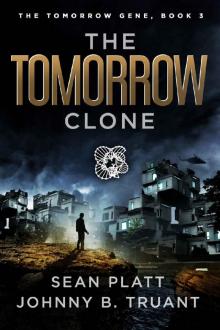 The Tomorrow Clone (The Tomorrow Gene Book 3)
The Tomorrow Clone (The Tomorrow Gene Book 3) Unicorn Western
Unicorn Western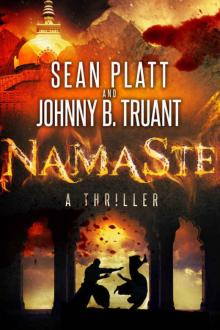 Namaste
Namaste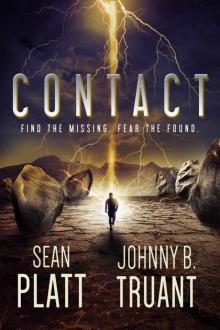 Alien Invasion (Book 2): Contact
Alien Invasion (Book 2): Contact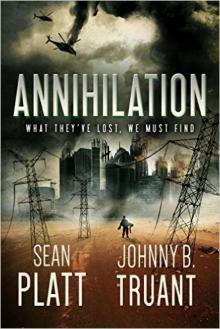 Alien Invasion (Book 4): Annihilation
Alien Invasion (Book 4): Annihilation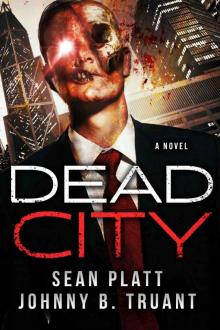 Dead City
Dead City The Eden Experiment
The Eden Experiment Unicorn Genesis (Unicorn Western)
Unicorn Genesis (Unicorn Western) The Beam: Season Two
The Beam: Season Two Yesterday's Gone: Season Six
Yesterday's Gone: Season Six Homecoming (Karma Police Book 6)
Homecoming (Karma Police Book 6)![[Alien Invasion 01.0] Invasion Read online](http://i1.bookreadfree.com/i1/03/30/alien_invasion_01_0_invasion_preview.jpg) [Alien Invasion 01.0] Invasion
[Alien Invasion 01.0] Invasion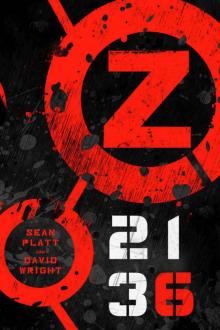 Z 2136 (Z 2134 Series Book 3)
Z 2136 (Z 2134 Series Book 3)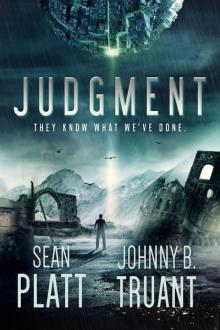 Alien Invasion (Book 5): Judgment
Alien Invasion (Book 5): Judgment Threshold
Threshold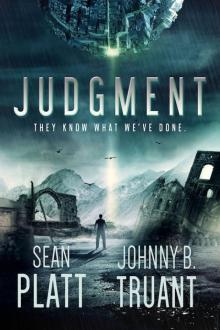 Judgment
Judgment Jumper: Karma Police Book One
Jumper: Karma Police Book One Boricio Goes Camping (Dark Crossings)
Boricio Goes Camping (Dark Crossings) Extinction
Extinction Yesterday's Gone (Season Four): Episodes 19-24
Yesterday's Gone (Season Four): Episodes 19-24![[No Justice 01.0] No Justice Read online](http://i1.bookreadfree.com/i2/04/09/no_justice_01_0_no_justice_preview.jpg) [No Justice 01.0] No Justice
[No Justice 01.0] No Justice The Beam: Season One
The Beam: Season One La Fleur de Blanc
La Fleur de Blanc The Collectors (Karma Police Book 3)
The Collectors (Karma Police Book 3)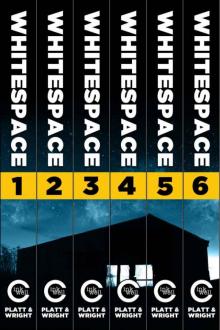 WhiteSpace: Season One (Episodes 1-6 of the sci-fi horror serial)
WhiteSpace: Season One (Episodes 1-6 of the sci-fi horror serial)